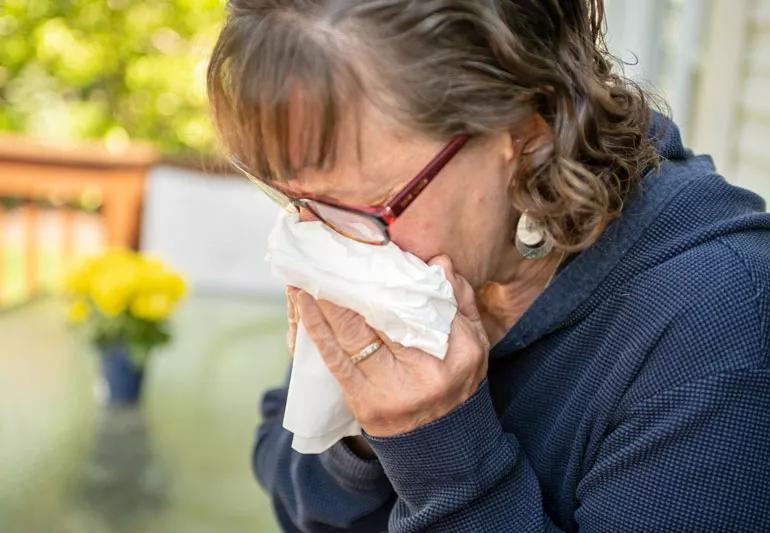Find out how allergies work on your body

If you have allergies, you know they can make you miserable. But are they a problem for life, or can you grow out of them?
Advertisement
Cleveland Clinic is a non-profit academic medical center. Advertising on our site helps support our mission. We do not endorse non-Cleveland Clinic products or services. Policy
Allergist/immunologist Lily Pien, MD, answers common questions about how allergies work, the importance of testing and what you need to know before choosing a doctor.
Allergies are a common problem that researchers believe affect 50 million people in the United States. They happen when your immune system reacts to a foreign substance in your body. And allergies can start at any age.
Common triggers include pollen, dust mites, mold, animal dander, insect stings, drugs and food.
In some cases, your body sees the substance as a threat and makes immunoglobulin E (IgE) antibodies that cause allergic cells to release histamine, which, in turn, releases mediators that causes allergic symptoms. Reactions can range from mild to severe, and may include sneezing, itching, hives or respiratory problems.
Dr. Pien says there’s not a definite answer to that question. She says, “Some individuals can lose clinical symptoms to allergens — which can occur with some medication allergies, such as penicillin. Children can sometimes outgrow food allergies like milk and eggs, and mild reactions to venom from insect stings.”
“There has been a recent shift in how we manage pediatric food allergies,” she says. “Building tolerance by offering increasingly larger amounts of an allergen may help those who are at risk for development of food allergies. Patients need to discuss this strategy with their physicians as this is a new and evolving practice.”
Advertisement
This approach is definitely not something you should try on your own at home. Always work with an allergist, Dr. Pien says.
If you have allergies or suspect that you might, it’s a good idea to work with a qualified allergist who can arrange for proper allergy testing, Dr. Pien says.
Recent advancements in testing materials are yielding more accurate allergy diagnoses, she says. If you suspect you may have outgrown an allergy, talk with your doctor about your diagnosis and find out whether getting retested makes sense.
Advertisement

Sign up for our Health Essentials emails for expert guidance on nutrition, fitness, sleep, skin care and more.
Learn more about our editorial process.
Advertisement

‘Rebound congestion’ happens when your body starts to rely on decongestant nasal spray

Time of day, time of year and weather patterns can all make your allergies worse

Allergies, postnasal drip, asthma or reflux could be to blame for a cough that won’t quit

Correct positioning is one of the keys to getting the best results

Pink eye tends to start in one eye before spreading to the other, while allergies usually affect both eyes at the same time

Most antihistamines, like Zyrtec, are OK, but avoid decongestants for at least the first trimester

Allergies, indigestion and the effects of gravity can all mess with your nose at night

Open the windows, keep a clean house and consider putting in preventive features like carbon monoxide detectors

Even small moments of time outdoors can help reduce stress, boost mood and restore a sense of calm

A correct prescription helps your eyes see clearly — but as natural changes occur, you may need stronger or different eyeglasses

Both are medical emergencies, but they are very distinct events with different causes